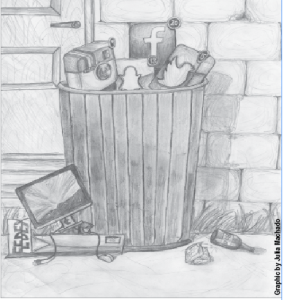Last May I had a goal: deactivate my Facebook page until school began in August. I’d decided that social media was worthless and distracting, and I wanted to prove to myself and my friends that I could go without it. So as school began to wind down, I said goodbye to my classmates in more ways than one.
 At first, deactivating my Facebook page wasn’t nearly as impactful as I’d suspected. I’d occasionally find myself mindlessly hitting the “F,” “A” and “C” keys as my cursor dangled in an open Google Chrome tab, but even that habit quickly faded. Studying for finals seemed to fill the time that I would have otherwise spent scrolling through my newsfeed. I reallocated the spare minutes I’d spent between classes browsing the Facebook app on my iPhone to keeping up with CNN and the Chicago Tribune. So after a week of Facebook-free life I was confused: why is it that social media appears so important to us?
At first, deactivating my Facebook page wasn’t nearly as impactful as I’d suspected. I’d occasionally find myself mindlessly hitting the “F,” “A” and “C” keys as my cursor dangled in an open Google Chrome tab, but even that habit quickly faded. Studying for finals seemed to fill the time that I would have otherwise spent scrolling through my newsfeed. I reallocated the spare minutes I’d spent between classes browsing the Facebook app on my iPhone to keeping up with CNN and the Chicago Tribune. So after a week of Facebook-free life I was confused: why is it that social media appears so important to us?
Once I’d handed in my last final and junior year had come to a close, I discovered that one week may not have been a significant trial period. Before deactivating my Facebook page, I hadn’t considered the small, but existent, group of people I kept in touch with only over the social media site. Because we’d never communicated through text or e-mail, those friendships were essentially cut off. Later, I found myself lacking a few photos I needed to complete a graduation gift for a close friend. While Facebook would have been an easy way to access the old pictures I needed, I no longer had that ability. Both of these seemed to be small inconveniences, and I was determined to remain Facebook-free.
Eventually, I realized a few other important features of the social media site. Torch relays information through our Facebook group. It’s often how I contact students for interviews. Many of my classes create Facebook pages to communicate homework assignments and discuss reading. Even though I didn’t need those things over the summer, I added them to my mental list of Facebook’s benefits.
But then came the most shocking revelation of all…I was missing things on Facebook that I had considered unimportant and irrelevant. While I’d always prided myself on being less dependent on social media than most of my peers, that self-perception proved misleading. I found myself wondering what was going on — what did the senior girls I barely knew wear to graduation? What could I find out about the new peer I’d met at debate camp? How had my classmates been spending their summers?
After a month, I ended up reactivating my Facebook. And the truth of the matter was I enjoyed it. Seeing my friends’ photos while I was away for the summer was entertaining. Knowing what people were up to gave me a sense of satisfaction. I wanted to be “in the loop.” But why do we feel like we need to know these things? I didn’t even think I wanted to.
Because we’ve subconsciously made social media into a crucial staple of our lives, we often forget that it’s not a necessity. It seems like everyone is connected these days. Whether it’s Facebook, Twitter or Instagram, we are all hooked into one another’s lives. The feeling of needing to know things — needing to know everything — is a habit. But it’s something we don’t realize. How many hours do you waste scrolling through your newsfeed or another social media equivalent?
As it turns out, I was asking myself the wrong question. Not everything about social media is bad… sharing photos, corresponding with our friends, homework help… it’s all fun or useful. But there are things about it that we don’t need.
Having 1,000 friends that we keep up with through a “timeline” of their lives isn’t necessary. Hoping that a high enough percentage of those “friends” will like our new profile pictures isn’t a healthy source of self-worth. Spending minute after minute clicking the right arrow key to view photo after photo of one of those thousand who we barely know isn’t worth our time.
So instead of asking myself whether or not I could be free of Facebook time, I’ve starting asking myself: can I be free of the wasteful Facebook time?


